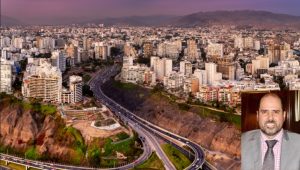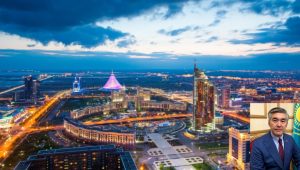UAE COP28 to unite divided world in climate action
The main aim of the 2023 UN Climate Change Conference is to push the world towards limiting global warming to 1.5° Celsius, and cutting down on the exploration and use of oil and gas is one of the crucial means of achieving this. The UAE has a big role to play here for reasons more than one
BY JYOTI VERMA
The United Arab Emirates (UAE) will host the 28th edition of the United Nations Climate Conference or Conference of the Parties (UNFCCC COP 28) at Expo City Dubai from November 30-December 12, 2023. A landmark event, the conference comes at a time when the world is struggling to save humanity from the worst of climate change’s future damages. According to the Intergovernmental Panel on Climate Change (IPCC), this requires slashing carbon pollution and fossil fuel use by nearly two-thirds by 2035. United Nations Secretary-General Antonio Guterres put it more bluntly, calling for an urgent end to new fossil fuel exploration and rich countries quitting coal, oil and gas by 2040.
The UN science panel, IPCC in its report released on March 20, 2023, calculated and reported that to stay under the warming limit set in Paris, at COP21 (also called the Paris Agreement), the world needs to cut 60 percent of its greenhouse gas emissions by 2035, compared with 2019. The overarching goal of the Paris Agreement is to hold “the increase in the global average temperature to well below 2°C above pre-industrial levels” and pursue efforts “to limit the temperature increase to 1.5°C above pre-industrial levels.”
The IPCC report said that the 1.5°C limit is achievable, but it will take a quantum leap in climate action. On his visit to New Delhi in February 2023, COP28 President-Designate Dr. Sultan Ahmed Al Jaber said, “It is also clear that business as usual won’t get us there. We need a paradigm shift in our approach to mitigation, adaptation, finance, and loss and damage.”
WHAT COP28 ENTAILS?
In this crucial decade for climate action, the UAE COP28 seeks to unite the world towards agreement on bold, practical, and ambitious solutions to the most pressing global challenge of our time.
Expected to host over 70,000 participants, including heads of state, government officials, industry leaders, private sector representatives, academics, experts, youth, and non-state actors, the climate conference will deliver the first-ever Global Stocktake (GST) – a comprehensive evaluation of progress against climate goals. The UAE will lead a process for all parties to agree upon a clear roadmap to rush progress through a realistic global energy transition, with an inclusive climate action. “The GST will provide the foundation to build momentum for this and future COPs, and the UAE will look for an ambitious outcome in response to the GST from the negotiation process. This will be a critical moment to mobilise political will to respond to what the science tells us will need to be achieved to remain on target and limit global warming to 1.5C by 2050,” said Dr. Al Jaber.
Sustainable cooling will be firmly on the agenda at this year’s COP28 meeting with UNEP promising a Global Cooling Pledge and a Cool COP Menu of Actions. UNEP will publish a Cooling Stocktake report ahead of the COP28 that will assess implemented country actions on sustainable cooling, evaluate new opportunities and offer insights into political action that can reduce emissions from the cooling sector.
While the summit will deliberate on several issues, an agreement on a global goal for climate adaptation, and setting up a finance facility for loss and damage due to climate change, experts believe that UAE COP 28 has the potential to achieve even more. It can become a defining moment where the annual climate conferences transition from multilateral negotiations to bold, confident decision making to hasten climate action.
TRANSFORMATIONAL PROGRESS
Dr. Al Jaber agrees. “The UAE COP 28 seeks to unite the world towards agreement on bold, practical, and ambitious solutions to the most pressing global challenge of our time,” said the COP28 President-Designate in his speech at the Petersberg Climate Dialogue in Berlin on May 2, 2023. He called for transformative action and robust outcomes across the mitigation work programme, the global objective on adaptation and doubling adaptation finance, the fair transition work programme, the New Collective Quantified Goal on Climate Finance, and the implementation of the loss and damage fund and funding arrangements.
Dr. Al Jaber said that the UAE is committed to bring everyone to the table, particularly youth, women, Indigenous peoples, NGOs, and the Global South, and called every stakeholder – countries and cities, investors and industries and businesses of all sizes – to step up with ambitious, transparent, and accountable commitments. “We must accelerate cross-sectoral progress on mitigation. We must ensure countries have the resources and plans in place to adapt to climate impacts. And, we must supercharge climate finance, making it more available, more accessible, and more affordable finance to drive delivery across every climate pillar. While doing all of this, we need to ensure a just and equitable transition,” the leader said.
In one of the most crucial statements on the pragmatic, just and well-managed energy transition, Dr. Al Jaber on May 2 said that the world must be laser focused on phasing out fossil fuel emissions, while phasing up viable, affordable zero carbon alternatives. “We know that the energies used today will continue to be part of the global energy mix for the foreseeable future. As such, we will work with the world to decarbonise the current energy system while we build a new one, capable of transitioning even the most heavy-emitting industries,” he said.
On May 9, the UAE Minister of Climate Change and Environment, Mariam Almheiri too said in an interview that phasing out fossil fuels would hurt countries that depend on them for revenue or cannot easily replace them with renewable sources.
While many question whether a major oil exporter can lead the way in climate negotiations with the exigency they merit, one may have more context and clarity if one considers the actions the UAE has taken in the last few years.
UAE’S CLIMATE ACTION
The UAE has practiced an unconventional approach of completely decarbonising and diversifying its economy, as it exported its oil. It has also tried to shift its domestic energy mix towards renewable and nuclear energy sources, in turn saving and releasing more oil for export. The country focused on funding the economic transition, with investments in renewable energy projects around the world. It targets carbon neutrality by 2050, as its Abu Dhabi National Oil Company aims to increase its production capacity by 19 percent by 2027. With this strategy, it makes a case to be one of the last oil producers with one of the lowest production costs and carbon footprints.
The UAE’s vision on sustainability is long term and goes well beyond the forthcoming climate summit. UAE President His Highness Sheikh Mohamed bin Zayed Al Nahyan has announced that 2023 will be the Year of Sustainability. The year will include several initiatives, activities and events that draw upon the the nation’s values of sustainability. It will also focus on environmental sustainability by inspiring collective action through a nationwide commitment towards sustainable practices.















